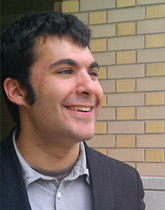Christopher Perrone isn’t taking notes on a lecture about the interaction between software and computer hardware. That’s because he’s not in class. He will have to get the notes from a classmate. Instead, the electrical engineering major is waiting in line at the University Center to receive his nametag for the university’s Spring Employment Opportunities Conference. Packed in Wiegand Gymnasium, Rangos Hall, and McKenna/Peter/Wright rooms are nearly 200 companies and organizations waiting to meet with students and offer them everything from internships to full-time jobs.

Perrone, a senior, knows the time is coming when he will have to start earning a living, which is why he is wearing his best suit. After signing in, he weaves through the dense crowd, navigating the maze of booths to find Motorola. Once there, he talks to the recruiter about his computer expertise. Evidently, the conversation goes well, because it concludes with a firm handshake. The recruiter takes Perrone’s résumé, gives him his email address, and asks him to stay in touch because the company might have an ideal position for him.
Spirits raised by his initial success, Perrone heads for the next stop on his list: IBM. Growing up, he heard countless praise about the technology giant from his grandfather, so a stop there is practically mandatory. Just like the recruiter from Motorola, the IBM representative is very encouraging and suggests that Perrone check out online the variety of positions available at IBM.
Moving on, he looks around to see what else is out there. Surprisingly, the Apple booth isn’t crowded at the moment. Having expected the line to be long all afternoon, he hadn’t even planned on talking to Apple. Those plans change. He walks up to the recruiter and introduces himself. He is heartened to learn that the one position Apple wants to fill is on its build team, a role entirely focused on working with software. It matches Perrone’s skill set very well. The recruiter invites Perrone to meet him at the Apple office in Pittsburgh the next day, which Perrone quickly accepts.
His next stop isn’t another booth. He realizes he’s almost late for his next class. He races down to the campus radio station where he works, changes quickly out of his suit, and sprints to class, already planning what he’ll say in tomorrow’s interview.
—Paul Carboni (DC’13)



